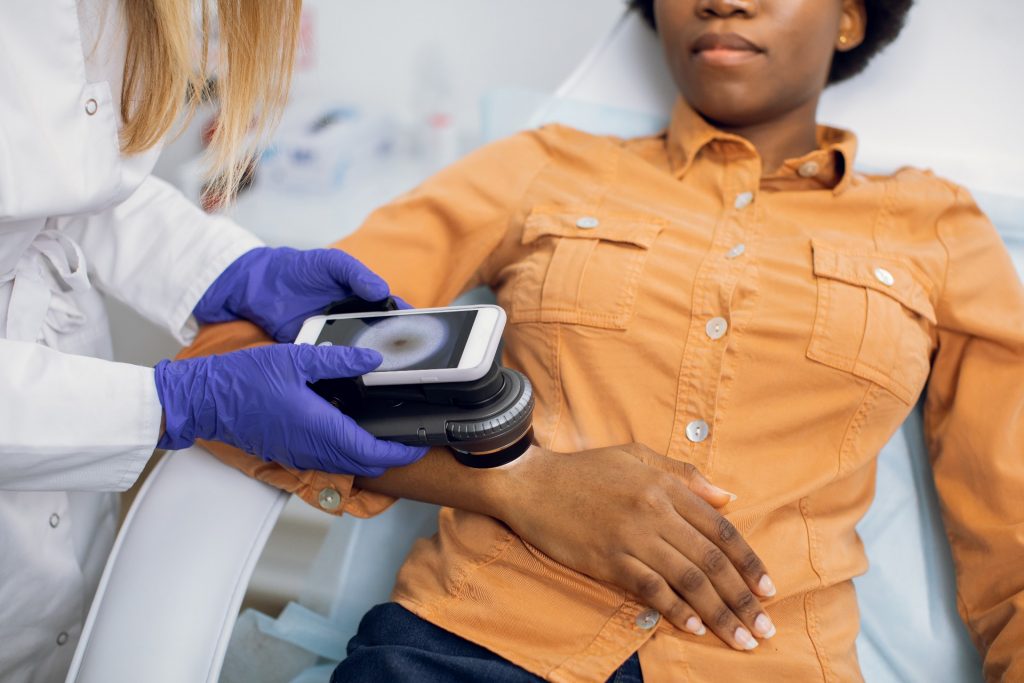Skin Cancer Screening Candidates

Contrary to what many people think, not everyone needs an annual skin cancer screening. However, some candidates should consider regular screenings earlier than others to ensure skin cancer is caught early and treated accordingly. Cancer is plaguing not only our nation but our world. Skin cancer is not as well-known as other cancers, like breast cancer, but left undetected and untreated, melanoma kills. In the last twenty years, melanoma has claimed more than 8,000 lives every year.
In an effort to raise awareness of the risk of skin cancer, the message was loud and clear: get a skin cancer screening performed by a professional dermatologist, especially if any identifiable symptoms, signs, or history may put individuals at greater risk.
Not Everyone Is at the Same Risk
What wasn’t expected was an influx of patients worried about skin cancer who were at low risk. The truth is that most people don’t need to begin getting skin cancer screenings more than every 2-3 years. A quality dermatologist does such a thorough job that anything suspicious is dealt with. These periodic checkups are sufficient for 80% of people. Patients worried about their skin and skin cancer should be aware of what is happening on their skin and always seek immediate help for any painful areas of concern.
The American Cancer Society published the Stages of Melanoma to assess cancer stage on a scale of 0-4. Women are highly vulnerable, with one in 40 developing melanomas in their lifetime.
Self Skin Cancer Screenings
Similar to self-exams for breast cancer, skin cancer screenings can be done to some extent at home. Clearly, it is more difficult to view every inch of one’s body without mirrors and some level of flexibility. However, most people have seen something that concerns them, or their family has a history of skin cancer. Candidates who should get screenings include both groups! A board-certified dermatologist performs a thorough skin cancer screening in the office, with no sedative needed. The procedure is done, checking in areas that most people may not think about, and seeing signs of skin cancer. Dermatologists also have the tools, equipment, and expertise to identify things earlier than someone without that background and knowledge.
Signs to Get a Screening
There are distinguishable signs of melanoma skin cancer that should not be ignored, which is why these lists are widely published. Early detection is critical, and most often, signs are found by an individual or a loved one. This list of things to look for is called the A-B-C-D-Es of moles.
A is for asymmetry, or irregular shaped moles may seem normal, but it is always better to get them checked than not!
B is for uneven borders around the mole. Uneven borders are one indication that something more serious may be happening and should be looked at by a dermatologist.
C stands for various colors within one mole – the color should be consistent, and anything other than that may indicate skin cancer and should be checked out by a professional.
D stands for diameter of the mole because a mole with a diameter larger than a pencil eraser is considered abnormal and can be inspected by a professional with the tools to get a closer look.
E stands for how the mole is evolving. Non-cancerous moles remain the same over time. Cancerous cells grow and morph, so the evolution of a mole can indicate skin cancer.
If none of these signs are present in the moles you are concerned about, you may seek a screening for peace of mind and will likely hear favorable results. However, if any of the ABCDEs do describe your mole, please consider getting a screening today.
Candidates Worth Checking Out
As with most cancers, family history can increase the risk. Some telltale signs of skin cancer include dozens of moles (not skin tags). Every adult has moles, but excessive numbers indicate a greater risk. A family or personal history of any cancer increases the risk to individuals, which is why many with a family history seek screenings earlier than others.
Organ transplants, Inflammatory Bowel Disease (IBD), and other conditions that involve using immune suppression drugs can increase the chance of developing skin cancer. Blistering sunburns and tanning bed use can also trigger skin cancer. Anyone falling into one of these groups should seek professional skin cancer screening from a licensed dermatologist.
If you live or work in Atlanta, Dr. Sherrie Straughn of Buckhead Dermatology has decades of experience and is an expert in skin cancer detection. Contact her offices today for an appointment at 404-816-4000 or click here and contact her online!
